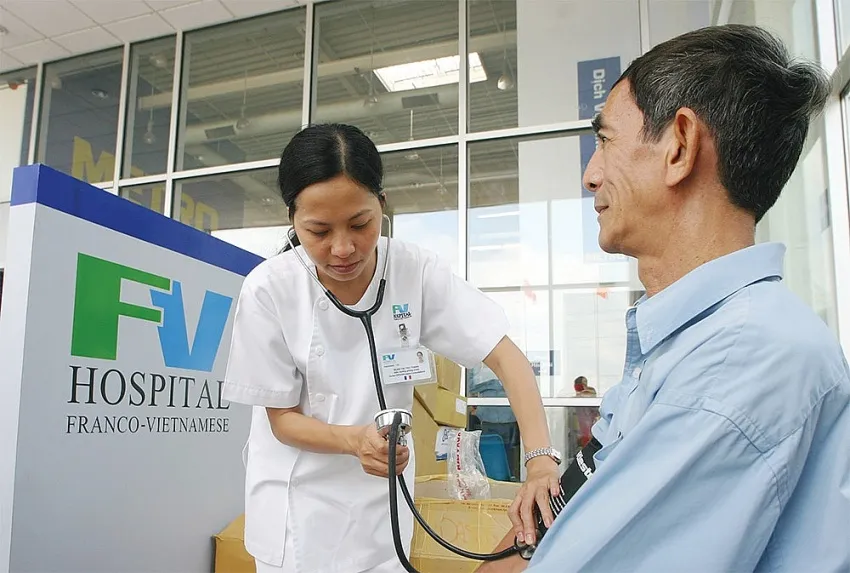
Surge in Healthcare M&A Activity
In 2023, healthcare emerged as one of the industries with the highest levels of mergers and acquisitions (M&A) activity, both in terms of transaction volume and value. According to data from Kirin Capital, a private equity investment firm, there were 11 M&A transactions in the healthcare sector in 2023, totaling $508 million in disclosed value. This represents a doubling of investment compared to 2022 and positioned healthcare as the industry with the third-highest M&A transaction value, trailing only finance and real estate. Importantly, the majority of buyers involved in these transactions were foreign entities.
In 2023, Thomson Medical Group, based in Singapore, made headlines by acquiring FV Hospital for a staggering $381.4 million, marking it as the largest acquisition in Vietnam's healthcare sector and the region's largest since 2020. Thomson Medical Group, a publicly listed company on the Singapore Stock Exchange, primarily operates in Singapore and Malaysia. Prior to finalizing the acquisition of FV, the group extensively evaluated approximately 20 hospitals, ultimately recognizing FV as surpassing its competitors in various aspects.
Moreover, the healthcare sector has witnessed a flurry of other investment activities. A notable example is Warburg Pincus, a prominent global growth investor based in the United States, which recently announced its investment in Xuyên Á Hospital on April 15. Although the exact investment amount was not disclosed, Xuyên Á Hospital stated that the infusion of new capital would be allocated towards enhancing patient care services, expanding investment initiatives, and elevating the caliber of medical personnel.
Warburg Pincus is renowned for its expertise in healthcare investments, and it has set its sights on transforming the Xuyên Á Hospital system into one of Vietnam's premier private hospital networks.
In a separate significant deal, Raffles Medical Group (RMG), led by Singaporean tycoon Loo Choon Yong, made headlines in October 2023 with its acquisition of a majority stake in American International Hospital (AIH) located in Ho Chi Minh City. While RMG did not disclose the specific number of shares or the transaction value, it emphasized its intention to acquire a controlling interest in AIH. Considering AIH's valuation at approximately $45.6 million, RMG's investment represents a substantial commitment to the healthcare sector in Vietnam.
Meanwhile, in the pharmaceutical arena, attention has been drawn to the Korean pharmaceutical giant Dongwha Pharm's acquisition of a 51% stake in Trung Sơn Pharma. Dongwha Pharm has articulated that this transaction aims to diversify its operational portfolio and has garnered significant interest through investment. The transaction's value is estimated at around 39 billion won (approximately $30 million), equivalent to over 710 billion VND.
Deciphering the Appeal
During the unveiling event at Thomson Medical in January, Deputy Minister of Health Tran Van Thuan emphasized the Ministry of Health's stance, asserting that there should be no differentiation between public and private healthcare sectors. Consequently, Vietnam actively promotes private healthcare, particularly through investments from international corporations. Mr. Thuan highlighted that the government's focus on developing private healthcare has intensified. Recently, the Ministry of Health proposed the enactment of Law on Examination and Treatment No. 15/2023/QH15 and Decree 96/2023/NĐ-CP, accompanied by guiding circulars, featuring numerous policies aimed at propelling the growth of private healthcare.
According to data, private healthcare presently represents only about 5.5% of Vietnam's healthcare system, a relatively modest share compared to the Asia-Pacific region. In line with Resolution 20 on enhancing healthcare and wellness, by 2025, private hospital beds are targeted to reach 10%, with a further increase to 15% by 2030, thereby supplementing the public hospital network.
Apart from regulatory measures, foreign investors are buoyed by the escalating healthcare demand from the burgeoning middle class.
World Data Lab, a renowned global data analytics organization headquartered in Vienna, Austria, reported that Vietnam ranks fifth in a list of nine Asian countries projected to witness the largest influx of individuals into the middle class in 2024, with an estimated 4 million people. The organization forecasts an additional 23.2 million individuals to join the middle class by 2030. As per their definition, the middle class comprises individuals who spend at least $12 per day, based on purchasing power parity in 2017.
It's worth noting that in the past, Vietnamese individuals often sought medical treatment abroad, but in recent years, this trend has waned due to the ongoing improvements in private healthcare. Particularly in the aftermath of the pandemic, there's been a notable uptick in people's willingness to allocate more resources towards enhancing their health.
Private healthcare providers are not only catering to the domestic population but also targeting a previously overlooked niche: medical tourism. While Vietnam may lag behind countries like Singapore, Thailand, or Malaysia in the realm of medical tourism, recent statistics reveal a promising trend. On average, approximately 300,000 foreign visitors seek medical treatment in Vietnam each year, with 40% of them concentrated in Ho Chi Minh City.




















